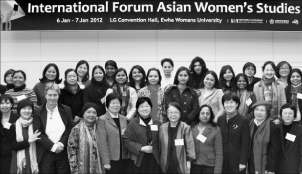
The program aims at helping empower women in Asia and Africa working in non-governmental organizations (NGOs) or in public interest sectors and nourishing the next generation of women leaders.
EGEP began with an international forum on the theme of “Asian Feminisms and Transnational Activism.” 12 faculty members invited from nine countries held lectures, and the participants visited the representative NGOs in Korea.
The program included a two-day long inaugural international symposium, workshop, and 10 lectures that focused on three main themes: Feminism and I, Asian Women’s Lives in the Era of Glocalization, Asian Women’s Solidarity and Alternatives.
The curriculum provided in EGEP enabled the participants to obtain training in female leadership and extend knowledge of gender research and analysis as well.
“Through EGEP, I wanted to update theoretical knowledge and the field experiences with other colleagues working in the same field,” said Chusana Han, who is a gender advisor at CARE International in Lao PDR.
“The program provided a space to share ideas on gender issues and women empowerment. It was indeed a very informative and valuable time for me,” Han said.
Ewha plans to carry on the program and hold it every January and July each year.
“The second group of EGEP applicants will be recruited starting March. If we decide to alter some parts of the program, we will do so in the EGEP 2012 winter program later on,” said Kim Hyo-jeong, the EGEP Programmer at ACWS.
“EGEP has built a collective mentality for the participants in being a strong network of Asian feminists. I learned things that I could not have learned from books. I would like to provide such opportunity to others to bring about the EGEP network at a larger scale,” Han said.
Hur Jin
cookiekat@ewhain.net

